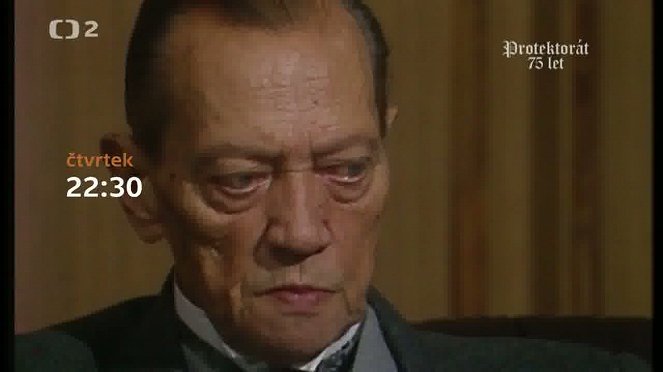Rendező:
Pavel HášaForgatókönyvíró:
Jiří Svetozar KupkaOperatőr:
Vladimír OpletalZeneszerző:
Petr MandelSzereplők:
Rudolf Hrušínský, František Němec, Josef Abrhám, Luděk Munzar, Soběslav Sejk, Petr Štěpánek, Jan Vlasák, Josef Šebek, Stanislav Lehký, Jiří Klem, Karel Polišenský, Karel Hovorka ml., Kamil Koula (több)Tartalmak(1)
On the night between 14th and 15th March 1939 Emil Hácha, the president of Czechoslovakia, was faced with a crucial dilemma: should he sign or should he refuse the agreement with the German occupation of the Czech lands? This TV film by Pavel Háša develops a personal drama about loyalty to one's conscience and the responsibility for the others. (Summer Film School)
(több)Recenziók (1)
With the television play itself, I have no problem at all, it is a strong dramatic material with a quality screenplay, great cast, excellent acting performances. The author obviously has the right to an artistic interpretation of historical events, neither he nor the viewers of that fateful March in Berlin were present. Of course, the play is also helped by the fact that it was Rudolf Hrušínský's last role, so it is a kind of solemn matter. I have more of a problem with the comments of other users, or rather with their political-historical conclusions. If Emil Hácha was anyone's victim, it was primarily of his own political views and personal profile. Emil Hácha was undoubtedly an educated intellectual with a sense of art and literature, but at the same time a conservative authoritarian bureaucrat who spiritually stagnated somewhere in the second half of the 19th century, a conservative Austro-Slavist, opponent of liberal democracy and the democratic liberal-democratic current represented in Czech society, for example, by Masaryk, Beneš, Peroutka or Čapek. He was simply a supporter of privileged casteism, traditional values, orders, and national entities. He had a lukewarm relationship with the Czechoslovak Republic and actually did not regret its end much. He longed for the old good Austria-Hungary with a strong influence of the Catholic Church. As a typical conservative, he admired authorities of all kinds, so he obediently served Masaryk and Beneš, just as he obediently served the Nazis and would have obediently served anyone else. even during the occupation, he used to pay homage to Masaryk's grave, but not because he agreed with his political views or in protest, but simply because Masaryk represented an unquestionable authority of his kind. It is characteristic that in the 1930s, Hácha maintained very close relationships with a number of prominent Nazi lawyers, he was, among other things, a guest of Reich Minister W. Funk. And he did not mind at all that these people supported Nazi totalitarianism. Hácha was never a fascist, but he belonged exactly to the political circles of the classic conservative right, which brought fascists to power in Italy and Germany. Hácha became president only thanks to the support he had in Germany, due to Germany's dominant influence during the period of the 2nd Republic, it was precisely the German government that practically decided on the appointment of the Czech president. Hitler preferred Hácha over the pro-Nazi František Chvalkovský, who, by the way, was the minister played by František Němec in the television play. Hitler despised Hácha and considered him a spineless official who would ensure the smooth running of the protectorate. And that's exactly what happened. Hácha was undoubtedly a collaborator, he represented an activist pro-German element, he lived with the idea that the Czech nation would be rewarded with decent treatment by Germany through friendliness and loyalty. Since 1942, Hácha was gradually excluded from political life by a severe illness, but that does not change anything about his pathetic role in the protectorate era. He never really felt like a politician himself, he was and remained a bureaucrat, he saw his election to the office of president as a bureaucratic honor when retiring. As a legal bureaucrat, he meticulously and mechanically adhered to legal forms, even in a situation where the law became a political instrument of totalitarian power... Overall impression of the television play: 80%.
()
(kevesebbet)
(több)
